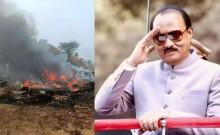
As Iraq has formally requested United States' help of airstrikes to eliminate the ISIS militants, President Barack Obama has indicated that should he take actions on Iraq, he would not need approval from lawmakers.
This comes as the situation in the war-torn, deeply divided Persian Gulf nation has grown increasingly tensed as the Islamic fanatics battled for control of Iraq's largest oil refinery on Wednesday.
Obama met with congressional leaders and informed them that he plans to consult with Congress on the on-going crisis but does not believe he needs the lawmakers' approval if he decides on military action to help the stumbling government of Prime Minister Nouri al-Maliki.
However, there are no indications that the administration will quickly sanction airstrikes in aid to Iraqi forces, as the US continues to take caution to be involved in an Iraqi civil war, having withdrawn their forces from the country only four years ago.
US Vice-President Joe Biden and Iraqi PM Maliki have discussed possible "additional measures" – though no one knows what exactly they are – by the US to assist Iraqi forces. A White House statement describes the two men's conversation as talks for considering ways "to roll back the terrorists' advances," the BBC reports.
The possibility of Obama administration's unilateral action sets up a potential new clash between White House and Congress, especially if the US indeed launches airstrikes against the jihadists, Islamic State of Iraq and the Levant (ISIL or ISIS).
This comes as conflicting reports emerged about the fighting for control of the refinery in Baiji, about 150 miles north of Baghdad.
While Iraq claimed the fight between the militants and its forces continued, reports from the scene suggested that the ISIS fighters controlled a large area around the facility, which processes as much as 40 percent of Iraq's oil. The fall of this refinery could provide the insurgents a massive new source of income, the New York Daily News notes.
Earlier on Wednesday, the Pentagon's top leaders expressed their concerns regarding risks of launching another bombing campaign in Iraq, saying that a hurried campaign could backfire if targets and goals were unclear, the Washington Post reports.
This came as Army Gen. Martin Dempsey, chairman of the joint Chiefs of Staff, confirmed that the Iraq's Shiite-led government has requested that Washington provide "air power" as it desperately tries to recapture territories seized by the notorious jihadists who could pose a long term threat to the world peace, according to analysts.
Iraqi official have said that their army are in need of US help, in the form of armed drones and fighter aircraft – something that Obama has neither denied nor approved.
Dempsey told a panel from the Senate Appropriations Committee that pinpointing the insurgents would be difficult as they have dissolved into the local population.
"It's not as easy as looking at an iPhone video of a convoy and then immediately striking," he said.
















